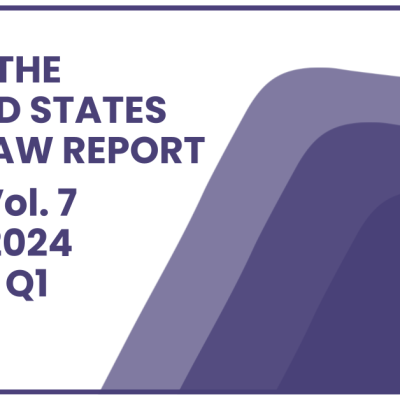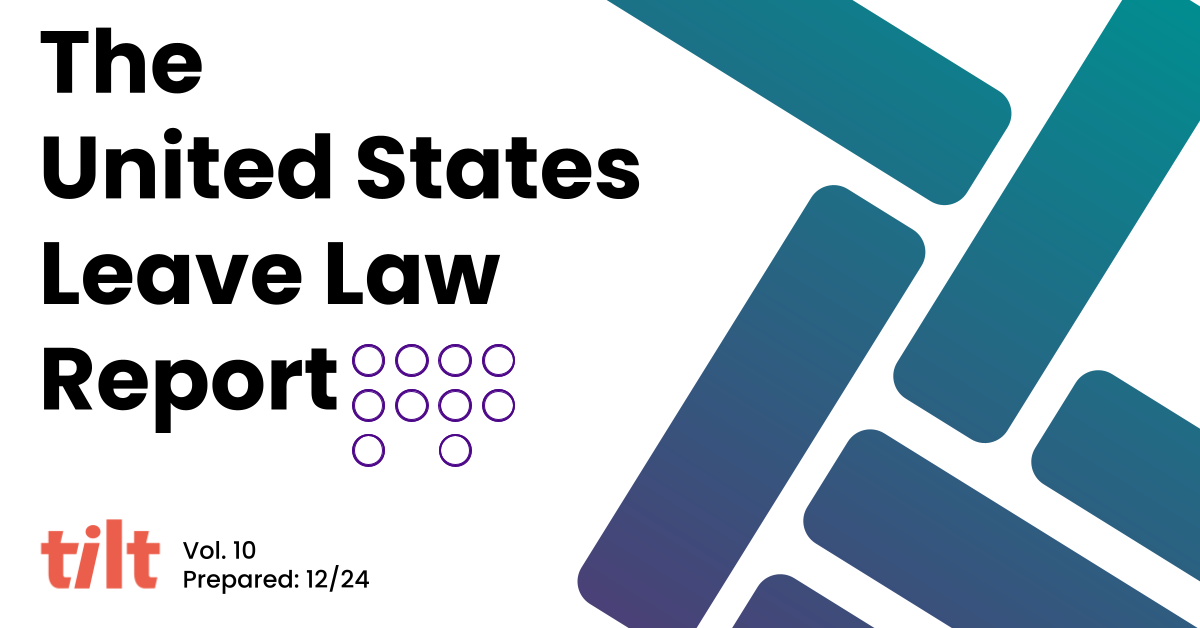It’s a new year and we’re bringing that same passionate leave law energy. We know that as you ramp up to accomplish your countless People Ops objectives the dynamic landscape of leave laws continues its evolution and you must be prepared.
Tilt’s team of leave law experts diligently monitors these changes year-round to keep you well-informed, and this nifty lil’ report provides you with the latest updates to leave programs that might impact you and your organization.
We hope you find the United States Leave Law Report Vol. 7 useful in your pursuit of supporting your employees and staying compliant!
Looking for all the insightful goodies from previous volumes? See what you might have missed here.
Federal Legislation: Paid Family & Medical Leave
TL;DR: Slow progress is better than no progress
As previously reported, House Democrats and Republicans formed a working group in January 2023 to explore options for expanding paid family and medical leave (PFML) nationwide.
The bipartisan group recently released a framework reflecting areas of consensus:
- public-private partnerships in the insurance space for states that want to set up new PFML programs;
- efforts to harmonize the current patchwork of state PFML laws; and
- help for small businesses via tax credits and resource pooling options.
The group will work to turn this framework into legislation after gathering input from stakeholders and collaborating with a similar bipartisan group in the Senate. There are still many hurdles to clear–especially around funding–but the bipartisan efforts in both Chambers of Congress are a sign of growing momentum.
National Protections: PWFA Regulations
TL;DR: December 2023 due date = delivery is imminent
The national Pregnant Workers Fairness Act (PWFA) went into effect in June 2023, but we’re still awaiting the publication of final regulations, due December 2023. When the regulations are published–which should be any day now–we’ll review them and report on any resulting changes to our support of leave as an accommodation under the PWFA.
State PFML Programs: Overview
TL;DR: Thirteen remains the lucky number
The state PFML landscape hasn’t changed since our last report: thirteen states (and Washington D.C.) have enacted mandatory PFML laws. These mandatory programs are funded through payroll deductions and guarantee partial wage replacement benefits to eligible employees who work for a covered employer and need leave for a qualifying reason.
Mandatory PFML benefits are currently available in California, Colorado, Connecticut, Massachusetts, New Jersey, New York, Oregon, Rhode Island, Washington and Washington D.C. Benefits will become payable in Delaware, Maine, Maryland and Minnesota in 2026.
In addition, eight states have enacted “voluntary PFML” laws that permit, but do not require, employers or employees to purchase PFML insurance as a private market product: Alabama, Arkansas, Florida, New Hampshire, Tennessee, Texas, Virginia and Vermont.
State PFML Programs Updates - Colorado
TL;DR: Post-launch, keep FAMLI requirements on your radar
Colorado’s Family and Medical Leave Insurance (FAMLI) program started paying benefits on January 1, 2024. As of January 10, the state had sent over $2.7 million in benefit payments to over 3,200 workers.
Under the FAMLI program, eligible employees can receive up to 12 weeks of paid leave for certain family, medical, military and safety reasons, and up to 16 weeks if the employee has complications related to pregnancy or childbirth. Most workers in Colorado will be eligible for paid FAMLI benefits, as the eligibility threshold is only $2,500 in wages earned in Colorado within a year. Employees can receive up to 90% of their wages, subject to a cap (currently $1,100/week).
Employees who welcomed a new child in 2023 and meet FAMLI eligibility requirements are entitled to up to 12 weeks of paid FAMLI bonding leave in 2024–even if they already took bonding leave under FMLA or an organization’s leave policy. However, the bonding leave must be completed within one year of the child’s birth or placement. Similarly, employees who exhausted all leave available to them last year for medical or caregiving reasons now have a fresh 12 weeks of leave entitlement, if they’re FAMLI-eligible.
For more information on the FAMLI program, check out the Division’s helpful toolkit for employers. The toolkit includes a program notice that was updated in December 2023. Colorado employers need to post the notice as specified in the FAMLI regulations. Employers must also provide a copy when an employee is hired and after learning an employee needs leave for an FAMLI-qualifying reason. (Tilt provides the notice to employees on behalf of customers whenever a leave is entered for an FAMLI-qualifying reason.)
Stories to Watch
TL;DR: New Mexico warmer than Michigan in latest PFML forecast
We reported in October that New Mexico and Michigan appeared poised to be the next two states to pass mandatory PFML legislation.
On January 13, 2024, New Mexico legislators introduced a new bill for consideration in the upcoming 30-day legislative session. If the bill passes in its current form, eligible employees could receive up to twelve weeks of PFML benefits in a year, starting in 2027.
Michigan’s progress on PFML legislation stalled when Democrats lost their voting majority in the State House, after two Representatives won mayoral elections. Progress should resume if Democrats win back the House majority after a special election in April. However, even if Democrats regain control, there might not be enough time to enact the PFML law in this legislative session because it’s likely to end early to allow members to campaign in this election year.
Other Leave Law Developments - Quick Hits
Massachusetts - New developments!
FURTHER changes to MA PFML top-up rules: In October, we reported that, effective November 1, 2023, employees had the right to top up their MA PFML benefits with any accrued vacation/sick/PTO time. In December, Massachusetts issued new guidance that limits that right. Massachusetts is now saying that an employee’s ability to use vacation/sick/PTO time to top up PFML will be dictated by their employer’s company policies, provided that those policies don’t discriminate against employees using MA PFML. Please review the updated guidance for details.
Massachusetts updated the MA PFML poster that employers must display, the MA PFML notices that employers must provide to new employees, and the rate sheets that must be provided to all covered employees. The 2024 versions are available here for download.
Washington, D.C. - Action Required by February 1, 2024
DC Paid Family Leave (PFL) Notice: Washington, D.C. updated its PFL Notice to Employees. This notice must be provided: 1) to covered employees within 30 days of hire, 2) annually to all covered employees by February 1st, and 3) to covered employees when they request leave that may be PFL-qualifying. (Tilt provides the notice to D.C. employees on behalf of customers whenever a leave is entered for a qualifying reason.)
California - January 1, 2024 Changes (prev. reported)
SDI wage cap lifted: California’s SDI program provides partial wage replacement benefits for employees who need time off work for non-work-related illness or injury, family caregiving and new child bonding reasons. In 2023, the SDI withholding rate was 0.9% on covered wages up to $153,164. As of January 1, 2024, all wages are subject to CA SDI tax. The additional tax revenue generated will fund an increase in SDI benefit rates/amounts in 2025.
Reproductive loss leave: Eligible employees can take up to 5 days of time off for a “reproductive loss event,” which includes loss related to adoption, surrogacy, miscarriage, stillbirth, or an unsuccessful assisted reproduction. The leave can be taken within three months of the reproductive loss event, or within three months of completing leave under another state and/or federal leave entitlement (FMLA/CFRA/CA PDL, etc), and can be taken intermittently. If the time off isn’t covered by an employee’s paid leave policies, the leave may be unpaid or the employee can elect to apply certain leave balances available to them, including accrued and available sick time.
Illinois - January 1, 2024 Changes (prev. reported)
Organ donation: Illinois expanded its blood donation law to include organ donation, renaming it the Employee Blood and Organ Donation Leave Act.
Bereavement expansion: Illinois expanded its bereavement leave law to require additional weeks of unpaid leave for eligible employees who lose a child by suicide or homicide. Illinois also amended its crime victim leave law to require unpaid leave related to the death of a family or household member killed in a crime of violence.
Paid Leave for All Workers Act (PLFAW): There are 17 states (plus D.C.) and 25 municipalities/counties that require employers to provide employees with sick and/or safe time, but only three require employers to provide PTO for any reason: Maine, Nevada, and now Illinois. The new Illinois law mandates that eligible employees receive at least 40 hours of PTO in a 12-month period; the state FAQ is a helpful resource.
Thank you for your interest in learning more about the latest leave laws impacting states across the country! At Tilt, we live and breathe all things leave and are passionate about supporting and educating everyone on the importance of empathetic and compassionate leaves of absence. If you have any questions about the latest leave laws or about how to better support your people when they need a leave…drop us a line.
About Tilt
Tilt is leading the charge in all things leave of absence management through easy-to-use tech and human touch. Since 2017, our proprietary platform and Empathy Warriors have been helping customers make leave not suck by eliminating administrative burdens, keeping companies compliant, and providing a truly positive and supportive leave of absence experience for their people.







